When imagination is empathy
Three Aussie books that challenge me to be a better writer — and human being.
There has been talk on my father’s side about writing a family history. My sister has been enthusiastic about the idea and has started collecting photos and writings from our aunts, who are also keen on this project. When she asked me to work on it together with her, I was hesitant.
It would be enough of a challenge making time for my existing writing projects, let alone adding a family history to the list. But given how much I’m struggling with writing anything other than these bimonthly posts, maybe the family history is the way to get an actual book under my belt and make future books easier?
If I’m honest, I didn’t and don’t feel excited in my gut about this project. However two books I recently read are making me think twice about it.
Her Father’s Daughter by Alice Pung and Wifedom by Anna Funder are very different books. But they’re both biography-memoir blends — and they both opened my eyes to the power of imaginative writing as an act of empathy.
I’m going to add a third book to the mix because three-point essays are ingrained in me for life. Also, as a work of fiction Damascus by Christos Tsiolkas provides an interesting comparison.
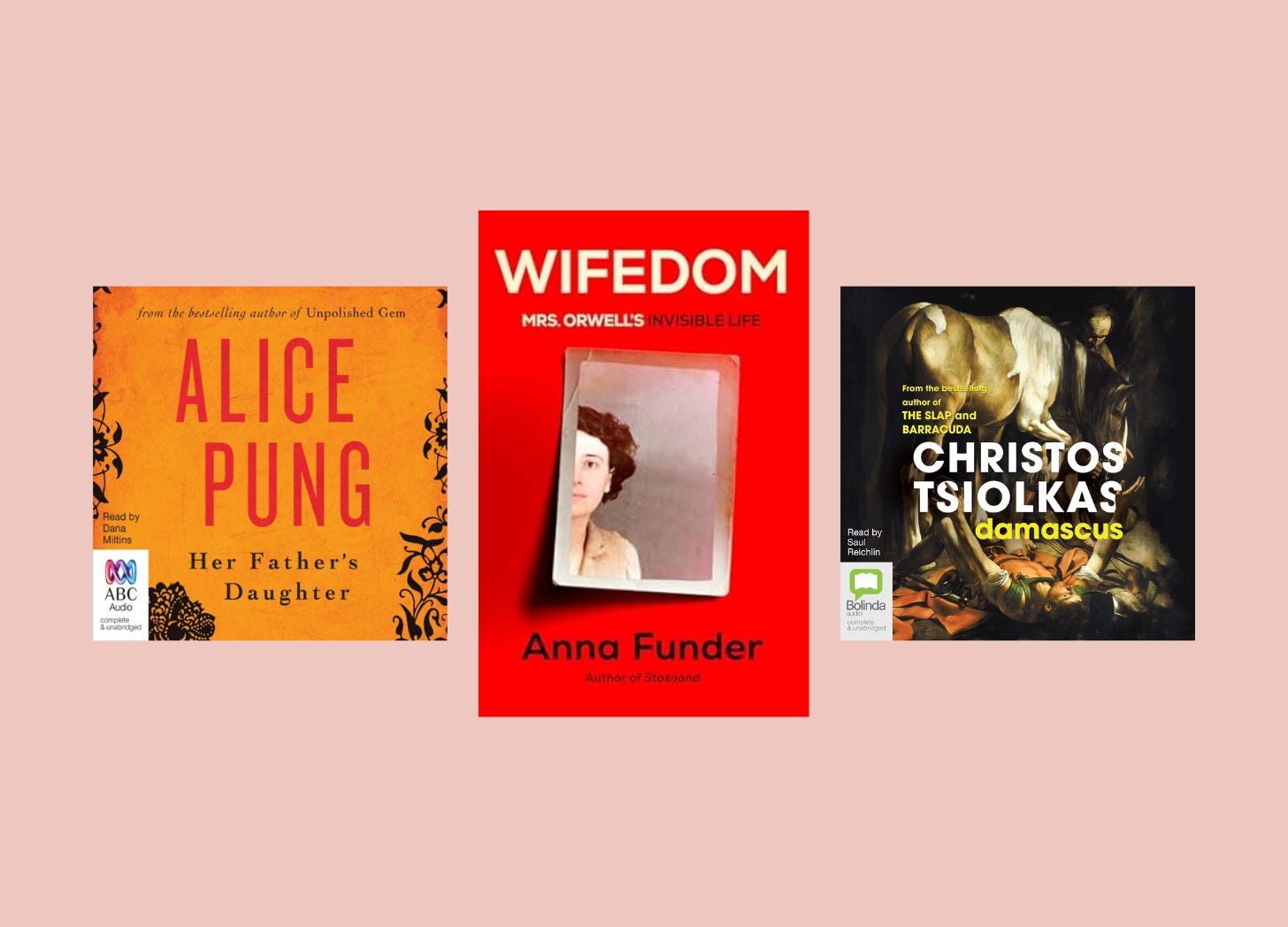
Her Father’s Daughter
There is an incredible passage in Alice Pung’s memoir-cum-biography that stunned me. It’s beautiful yet brutal, brutal yet beautiful. It’s devastating – much like the events it describes. (Please skip it if you’re sensitive).
Menu, using wartime rations
In 1969 and 1970, Nixon and Kissinger – names which made you think of cartoon characters with sweet puckered lips – bombed a neutral land without the knowledge of their own countryfolk and called it Breakfast.
'Breakfast' was hanging by a thin strip of meat the colour of prosciutto; a boy's arm from a torn t-shirt sleeve, swinging like a hock of ham, well smoked. Fried eggs in the womb of a young woman, fully cooked.
But breakfast was not enough.
It was as if they could not find the cheap plastic toy in the cereal pack. Their B52s could not dislodge the Viet Cong from their bases, so they decided that a full menu operation was in order.
Lunch: slow-roasted ragged folks, thin as tarantulas, seasoned with sweat and the salt of the earth.
Snack: crackling skin with beautiful blisters; lady fingers, already peeled.
Supper: rare, medium or well done small ones, squealing like piglets; medium-sized ones, bleating like hoary goats. There were no large ones.
Dessert: sweet young girls, blouses burst open, tender as pink cupcakes, hundreds and thousands on top.
I have visited The Killing Fields in Cambodia and seen with my own eyes the trees where they bashed babies to death. Pung’s picture of the US’s Operation Breakfast is likely drawn from archive material on the Khmer Rouge years. She’s applied her imagination to that research to great effect, giving us this unforgettably visceral passage.

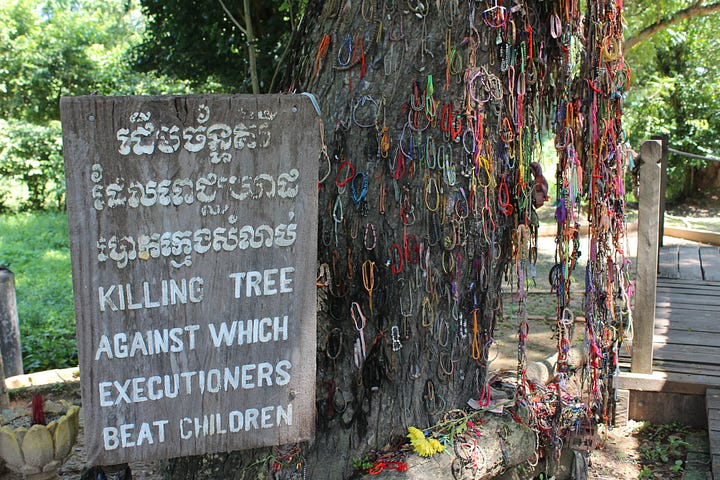
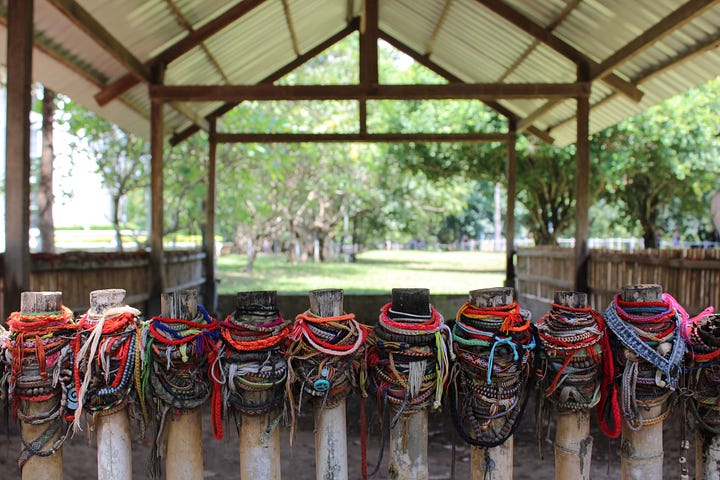
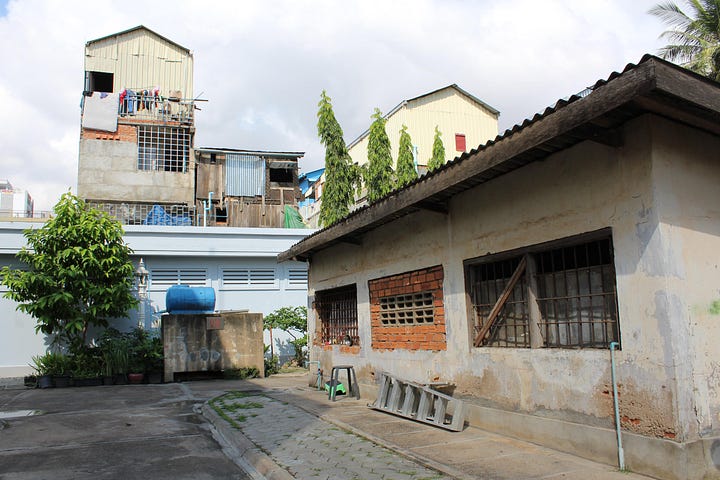
Yet the more I reflect on her book, the more I’m convinced her biggest achievement here is far more personal.
Her Father’s Daughter alternates between the perspective of the daughter (Alice) and that of her father (Kuan), with both sides written in the third person. It’s remarkable that Kuan – who survived Year Zero and fled to Vietnam before meeting her mother then escaping together to Australia – relayed enough of his ordeal to his daughter that she could write a good chunk of a book about it. It’s unusual culturally for an older Asian man – let alone one who has endured deep and possibly ongoing trauma – to be this open. And with his own daughter, knowing she would be writing it up for broad publication.
Pung interviewed her father about a very dark time in his life and then created narrative scenes from that.
[h]is team would collect the shit and mix it with water to make wet fertiliser for the vegetables … He marvelled that a dying cluster of people could still create life from their bodies, could make things grow even though they were being eaten away by hunger.
She interweaves her father’s Cambodian past with more recent events and interactions with her, and with her own memories of young adulthood.
In writing the father’s perspective in this book, she really puts herself in his shoes, looking at the world through his eyes:
His daughter is in a different country and she will get herself into trouble. He just knows it. He has a feeling. He remembers at the airport a woman with a baby in her arms, carrying two suitcases, waiting to board the same plane as his daughter. He saw his daughter offer to carry one of the bags, just as she was about to pass through the boarding gate. He was too far away to call out to her, and he felt ridiculous. It was only a domestic connecting flight and there was no death penalty in Australia. But he worried about drugs. Why did she do such stupid things? And now she was in Beijing, living in an apartment by herself, writing. Why did she have to go so far away to do that?
Pung asks what her father would have thought about her decisions and why. She shows us his life before she was born. She strives to understand how he became the way he is. She does this with compassion and in a way that honours Kuan’s tenacity and love for his family.
I was very moved by this and found it to be a wonderful example of empathy through imagination.
Wifedom
Most of us have heard of George Orwell and likely read Animal Farm and/or 1984. Most of us will not have heard of his first wife Eileen O’Shaughnessy.
Wifedom is both thoroughly researched and thoroughly imagined. Funder brings to life scenes from the Orwells’ marriage – based on just a few of Eileen’s letters to a friend that survived.
It’s more than a biography of Eileen O’Shaughnessy. A few key twists turn it into something else:
Funder inserts herself – as an Orwell fan, a writer and a wife – into the pages. What she learns as she researches become opportunities for self-reflection, and she weaves her emerging thoughts into the text.
She invents scenes down to visual and tactile details, conversations, internal thoughts of those present.
All of the above is in service of a powerful argument running through the book: that Orwell and his biographers erased Eileen and the pivotal role that she played in his celebrated life and work.
Funder doesn’t just give the world a half-truth half-fiction window into an otherwise forgotten woman. She uses her imagination to find and fill the gaps in the historical record, to ask questions about Orwell, his wife and his biographers.
In the scenes Funder renders, some of the objects, words exchanged and words thought but not voiced are real – drawn and assembled from scraps of letters, old photos, archive material, Orwell biographies and her own visits to relevant locations. Some of the details are, by necessity, dreamt up by the author to complete the scenes. In this excerpt, the italicised portions are the words that Eileen wrote in her letters to her friend Norah, and the rest is of Funder’s creation:
You see I have no pen, no ink, no glasses and the prospect of no light, because the pens, the inks, the glasses and the candles are all in the room where George [Orwell] is working and if I disturb him again it will be for the fifteenth time tonight. But full of determined ingenuity I found a typewriter, and blind people are said to type in the dark.
The dog lies sideways on the hearth, dreaming.
I found a bit of a letter to you, a very odd hysterical little letter, much more like Spain than any I can have written in that country.
She found it in a dress pocket when she unpacked, and it lies crumpled in front of her. Hopefully this fresh one will make more sense. She puts the cigarette between her lips and types with one eye closed.
These questions develop into a wholly compelling theory about the erasure of Eileen from history and specifically from credit for Orwell’s success.
“Even at the periods where I [Orwell] was working 10 hours a day on a book, or turning out 4 or 5 articles a week, I have never been able to get away from this neurotic feeling, that I was wasting time.”
But he isn't wasting time. Eileen is making more of it for him than he could ever have if he had to manage his own life. She deals with much of his correspondence, including with his agent. She organises their social lives, does all the shopping (involving a bus ride to the village of Baldock three miles away) and much of the cleaning (there is, intermittently, a 'char'). Eileen's working conditions are difficult.
It’s Funder’s imagination that finds and retrieves the hidden traces that Eileen left in the world. The erasure of Eileen is most apparent in Orwell’s book about his involvement in the Spanish Civil War. Funder writes:
… knowing what happened when, who was there but isn't in the text [of Orwell’s book Homage to Catalonia] – this feels like a moment to unpack. A moment when Eileen can be glimpsed, if in a negative way, like dark matter that can only be apprehended by its effect on the visible world. The way the text buckles and strains to avoid her is the way I can see the shape she left…
When he [Orwell] finds out that 'all was well, nobody had been shot’, he is finding out that Eileen is okay. ‘Nobody’ is her.
In the research and the writing of her book, Funder has spent a lot of time looking at events from Eileen’s perspective and transmitting this to her readers. Empathy-fuelled imagination. The finished product is a revisionist history — and it’s one that honours Eileen’s talent and her sacrifice.
Damascus
Christos Tsiolkas’s novel1 is a work of fiction about the Apostle Paul and several other historical figures. The book is brutal and challenging yet impressive, not least for the way the author – an atheist – imagines Paul’s faith and explores how that faith might have driven his thoughts and actions.
At 15, Tsiolkas’s sexuality led him to walk away from the Orthodox faith he was raised in. It was a life-changing, paradigm-shifting decision. It’s interesting to see him return to the sacred text of the religion he left, four decades later.
To write Damascus, he studied the Bible at length as well as other historical documents. This enabled him to imagine the first-century Roman Empire, recreating the brutality of its society with its sights, smells and sounds. His research also became the source material from which he draws his complex portrait of the highly influential figure of Paul. The world and character he’s created are the fruit of imaginative empathy.2
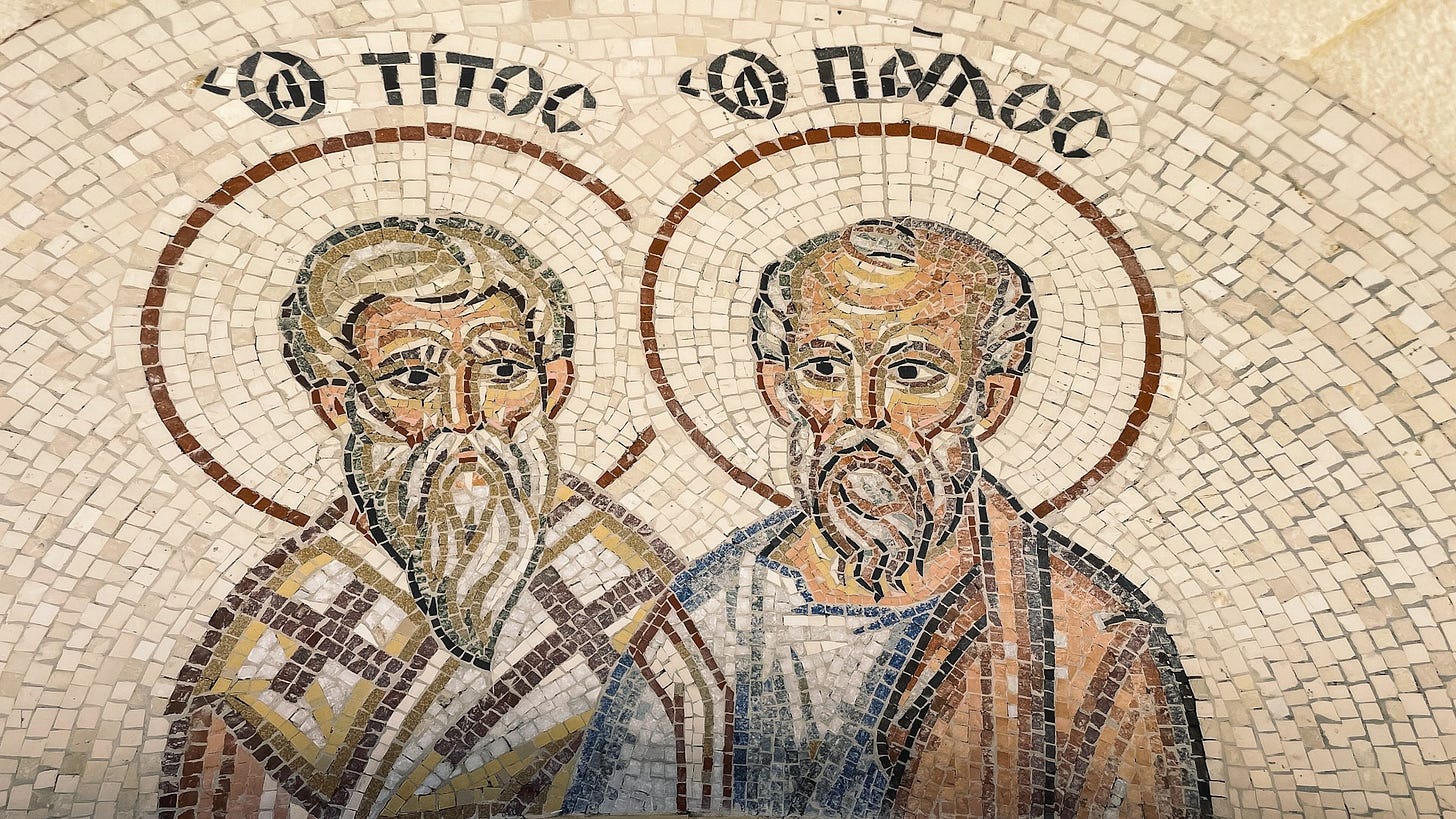
In the Bible we can read letters in which Paul refers to his weakness, the infamous thorn in his side, how unimpressive he is in person:
For some say, “His letters are weighty and forceful, but in person he is unimpressive and his speaking amounts to nothing.” (2 Corinthians 10:10)
And:
…in order to keep me from becoming conceited, I was given a thorn in my flesh, a messenger of Satan, to torment me. Three times I pleaded with the Lord to take it away from me. But he said to me, “My grace is sufficient for you, for my power is made perfect in weakness.” Therefore I will boast all the more gladly about my weaknesses, so that Christ’s power may rest on me. (2 Corinthians 12:7b-9)
Yet he himself never gives his readers any details on this — either he keeps it private or it’s assumed knowledge for his intended audience. But Tsiolkas sets his imagination loose here.
While reimagining Paul as a repressed gay man may or may not be factual (and I didn’t find his unrequited love for Timothy plausible), Damascus reveals to us a Paul who is deeply human. Tsiolkas’s Paul struggles constantly: with lust, jealousy, insecurity, doubt, rage, pettiness and the list goes on.
Paul gets a bad rap, particularly in conversations about Christianity, gender and sexuality. But this book reminds us that Paul was a real person with real struggles — as well as real valour.
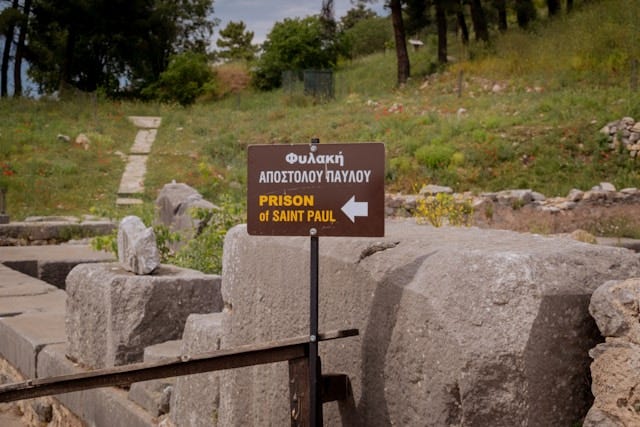
I’m intrigued that the author spent so much time imagining and reimagining a historical figure whose worldview clashes with his own. It’s like he decided he would find a way in which that worldview could make sense to him: What if Paul’s strong stance against homosexuality was a result of his own struggles with it? What if his zeal came from a keen awareness of a grace that redeemed him from his wretchedness?
Tsiolkas is generously compassionate towards his flawed and tortured Paul character. Amidst the uncomfortable vices that plague him, we see how the apostle’s genuine love and leadership transform the lives of others around him.
The author’s compassion in turn evoked more compassion in me for Paul — because let’s be real, I too feel mad about some of the things he wrote, at least when read at face value.
A personal reflection
Of course, you could argue that there’s empathy involved in all writing about real people and in developing fictional characters with any depth. And when we read stories, we’re exercising our own empathetic muscle, too.
For me, Her Father’s Daughter, Wifedom and Damascus stand out because the empathy in them is intentional and purposeful. Pung set out to understand and honour her father. Funder’s aim was to reveal and do justice to Eileen O’Shaughnessy. Tsiolkas wanted to bring the historical Paul to life as a multidimensional character.
There was a personal wrestle for all three authors as they engaged with these other lives. As they researched and wrote, they were confronted by the question of What does this mean for me now? They allowed what they learned to challenge their own lives and beliefs.
Perceiving the empathy required for the writing of these three books has challenged me as a writer – in a good way, to grow. As I reflect on my own craft, it seems to me that I use my imagination as a tool for self-empathy: to understand my past and present self, and perhaps in some way to honour who I have been and who I have become.
But how might I – like Pung, Funder and Tsiolkas – harness the empathy of imagination to honour others?
At work, part of my role involves sharing the stories of our clients, who are refugees, people seeking asylum and stateless individuals. When I draft stories, am I exercising empathy through my imagination? Does the way that I go about this honour the refugees whose stories we share? How can I do this better?
While maximum agency and empowerment would involve the client writing their own story (like one refugee we worked with did recently), perhaps there is some good that comes out of my efforts, too – as a person outside of the situation putting myself in the refugee’s shoes and writing something that is (ideally) honouring, empowering and compelling.
With all this in mind, I return to the question of our family history. Could this be an opportunity for me to use my imagination as an act of empathy? Could it be a way to honour my father, my aunts and my uncles, and the grandparents I never or barely knew?
*
Well, this was a long one — thanks for sticking with me! And as always, I welcome your thoughts, critiques and reflections.
🧡 suansita k.
P.S.
Recently, I started reading my hard copy of the latest edition of Comment magazine. Tara Isabella Burton’s essay references Ignatian spirituality and imaginative prayer:
Imagination is a spiritual faculty, although it is more often associated with fiction and falseness than spiritual truth. Part of the process of discernment, when taken in the context of the Spiritual Exercises, is imaginative prayer.
… As a novelist, I confess I am drawn to this unity, in part, because I find that the imaginative work of the best novels—and, indeed, the best plays—so often calls us, albeit in a far more mediated way, to honestly and compassionately encounter a world in which goods are competing. In fictional worlds we can experience how answers are not always obvious, and one’s relationship with God nuances individual decision-making in ways that doctrine alone cannot.
On another note, a different example of imagination deployed in a similar way to Pung and Funder can be found in the series American Scandal and American History Tellers. Both are narrative non-fiction podcasts, telling real events in story form through a single narrator. The writers imagine detailed conversations, expressions, thoughts and feelings to craft scenes for which there is no historical record. It’s pretty interesting, if occasionally cliched.
If you liked this, you might want to read …
I occasionally write about books, when they really get me thinking and reflecting about my own life and practice. Like this post, they’re sort of review-reflection hybrids:
I’ve also been sharing my top books at the end of each year:
I’ve drawn heavily from my earlier review of Damascus for the relevant sections above. I listened to the audiobook so it was difficult to include quotes in my discussion of the work.
This reviewer is more dubious about empathy for historical people in Damascus.



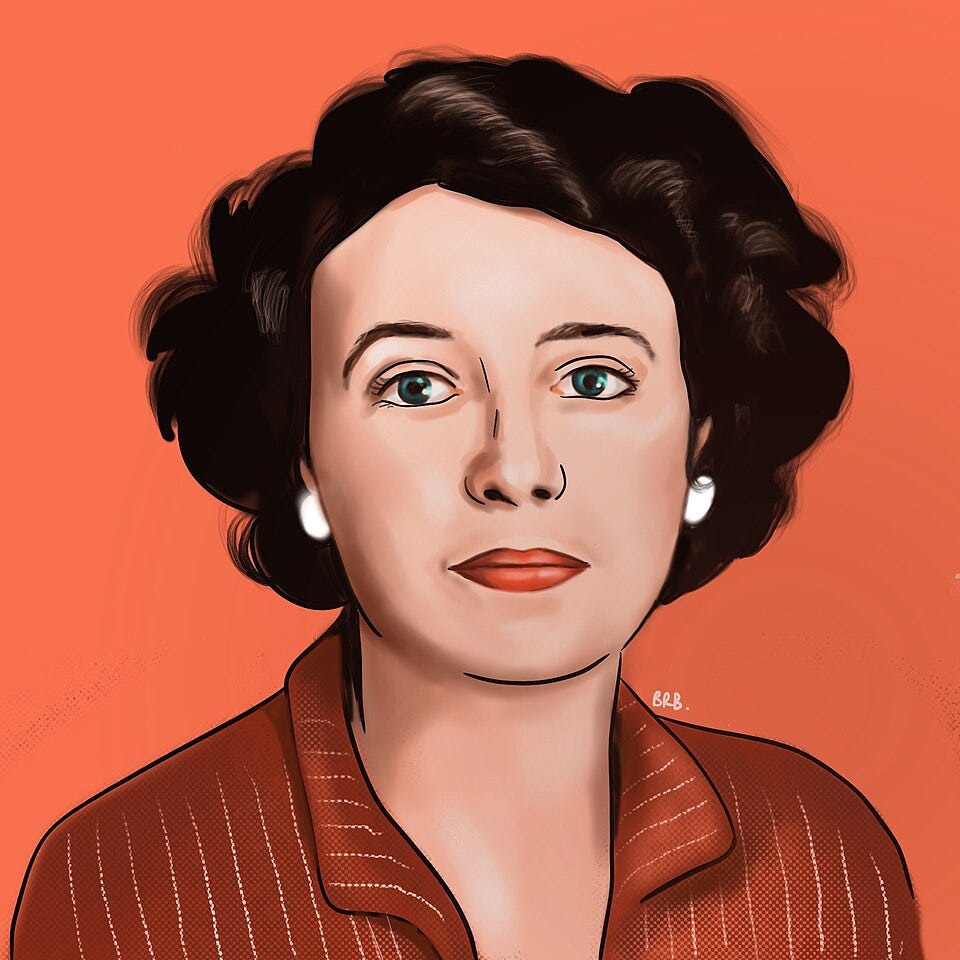
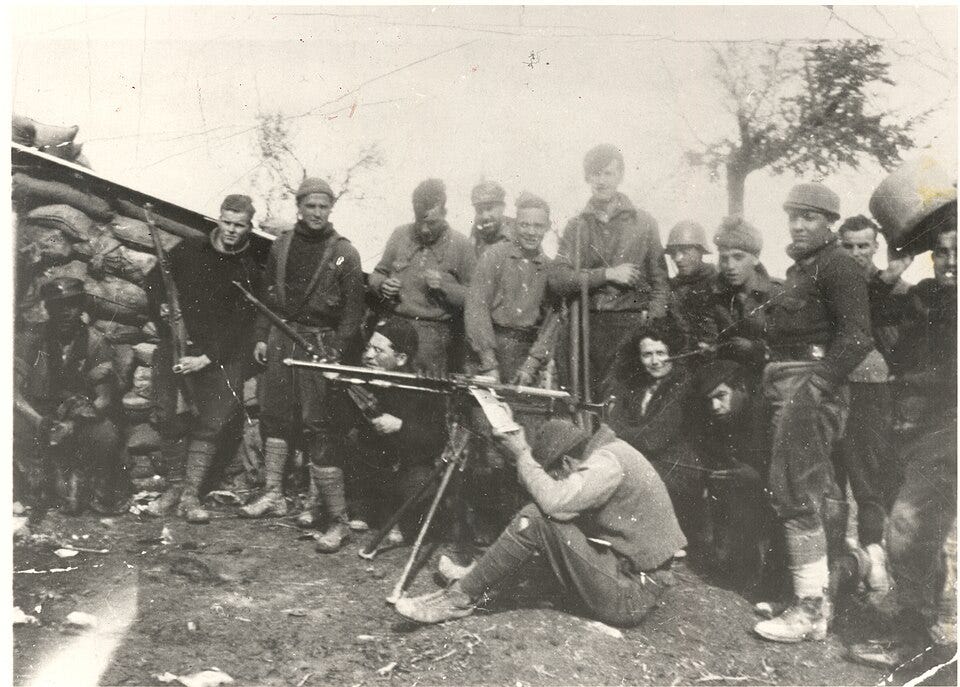




Brilliant essay teasing out the common thread that made each book so good. Thanks for sharing